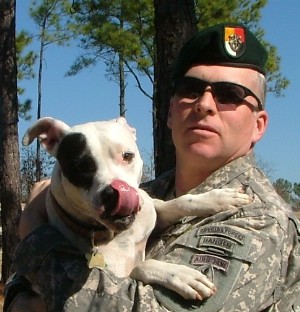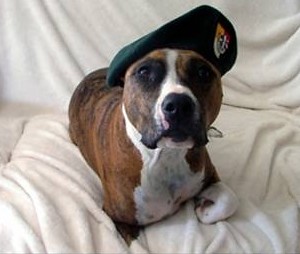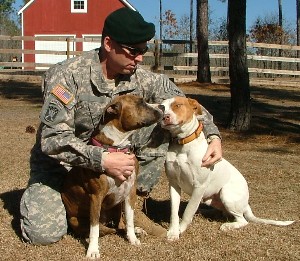By Steve Dale 
The First Lady, Michelle Obama cares deeply about families, in particular, military families. According to the American Veterinary Medical Association (and other surveys), most people in America have a pet, and the overwhelming majority of those consider their pets' family.
Lynette Lynde and her husband, who reside just outside Ft. Bragg, NC, are no exception. It just so happens that Lynette's husband has scarified for America as few of us have. He's a decorated career Special Forces soldier who is currently recovering from back surgery as a result of injuries sustained in his last deployment in Afghanistan. Lynette says, "Our dogs are our family. Our dogs are well-maintained friendly dogs. There's never been a complaint."
Then what's the problem? They happen to be Pit Bull looking dogs, except for one, who is a Rottweler-mix. As a result, Lynette and her husband may be forced to give them up. Lots of dog breeds will no longer be allowed on military housing property, according to new policy announced in a memo stamped January 5 from the United States Department of the Army. According to sources, the directive was approved by the Pentagon just prior to President George W. Bush leaving office.
The subject line of the memo reads: "Pet Policy for Privatized Housing Under the Army's Residential Communities Initiative Privatization Program. Pit Bulls (American Staffordshire Bull Terriers and English Staffordshire Bull Terriers), Rottweilers, Doberman Pinschers, Chow Chows and wolf hybrids are now banned."
Ledy VanKavage, senior legislative analyst at Best Friends Animal Society is outraged at what amounts to canine profiling. "Decisions about dogs should be based on individual temperament not appearances," she says.
Besides, appearances can be deceiving. VanKavage is concerned about who will identify the Pit Bulls. "Are there people truly trained to understand subtle differences between breeds and identify dogs correctly? If not, this puts a lot of mutts at risk as well."
According to the ruling, dogs of any type who currently live on base can be grandfathered in. However, Lynde points out that families are frequently being asked to re-locate. When they  do, they can no longer bring their banned dogs with them. Similarly, new enlistees must leave their dogs at home if they're indentified as a banned breed.
do, they can no longer bring their banned dogs with them. Similarly, new enlistees must leave their dogs at home if they're indentified as a banned breed.
Then what happens to any banned dogs identified and then forcibly relinquished by transferring military? Lynde says, "No one seems to have that answer."
With morale already low on military bases, according to Lynde, she believes the ruling has already begun to further impact morale. "What kind of family support is this? I tried to communicate with the Garrison Comander's Office (at Fort Bragg), but I got nowhere," she says.
The only member of the U.S. military available for comment for this story - a spokesperson at Ft. Bragg - couldn't comment after all because she doesn't know enough about dogs to do so. Additional phone calls and emails to 'spokespeople' weren't returned.
No one can explain exactly what led to this ruling, and why these specific breeds have been targeted. There have been several dog attacks in recent years on U.S. military bases, just as attacks happen in cities – but the attacks are rare events. "Well, at best, that may explain the ruling, but it doesn't excuse it," says VanKavage. "It's a knee jerk and illogical response."
Lynde says as far as she knows, the closest incident which might perhaps be called an attack at Ft. Bragg occurred several years back as two dogs chased a child on a bicycle. But the dog involved is not on the breed ban list.
VanKavage and Lynde appeared February 15 on my WGN Radio show, Pet Central, to break this story, and one email (of several) was from a listener at Ft. Hood, TX. He didn't sign his name, fearing the safety of his dog. "I believe my dog is a Pit Bull/Shepherd mix," he wrote. "For sure, I am now telling everyone that she's a Shepherd breed from Belgium (there are actually several Shepherd breeds from Belgium) hoping that'll sound exotic and interesting instead of dangerous. Being forced to give up my dog, I would be devastated and so would my little girl. I believe Sparky and her have a very special bond, particularly since we have no other children."
 At Ft. Bragg, a member of the military who also preferred his name not no be used said he currently owns a pit bull that was grandfathered into the base housing. He and his wife opted not to purchase a home off base because he had planned to attend Physician's Assistants school at Ft. Sam Houston later this year. After the ban was implemented and they realized that they would need to surrender their dog if they moved to another base, he abandoned this idea completely. He only has one year until he is asked to re-enlist. They have decided that if at that time, the Army wide breed bans are still in place, he will get out of the Army all together to ensure the safety of his family.
At Ft. Bragg, a member of the military who also preferred his name not no be used said he currently owns a pit bull that was grandfathered into the base housing. He and his wife opted not to purchase a home off base because he had planned to attend Physician's Assistants school at Ft. Sam Houston later this year. After the ban was implemented and they realized that they would need to surrender their dog if they moved to another base, he abandoned this idea completely. He only has one year until he is asked to re-enlist. They have decided that if at that time, the Army wide breed bans are still in place, he will get out of the Army all together to ensure the safety of his family.
VanKavage says that even if you don't have a dog – if you sympathize with military families, call your United States Senator or U.S. Representative. "This is still news, and it's likely most public officials aren't aware of this ban and affront to military families," she says. "I believe in my heart President and Michelle Obama would be appalled."
 On Saturday Feb 7th ,2009 Hello Bully hosted their first annual Lovers Not Fighters Gala at the Town Tavern in Southside, Pittsburgh PA.
On Saturday Feb 7th ,2009 Hello Bully hosted their first annual Lovers Not Fighters Gala at the Town Tavern in Southside, Pittsburgh PA.  auction items, raffle prizes, food and drinks. The fashion show featured designs from: Decade Boutique, Zombie Apparel, Mod Cloth and Healing Heart. Miss Pennsylvania, was a special guest, and could not stop cuddling with the available pups.
auction items, raffle prizes, food and drinks. The fashion show featured designs from: Decade Boutique, Zombie Apparel, Mod Cloth and Healing Heart. Miss Pennsylvania, was a special guest, and could not stop cuddling with the available pups.  ion and raffles. One Pit Bull owner even donated a week at her time share.
ion and raffles. One Pit Bull owner even donated a week at her time share.





















